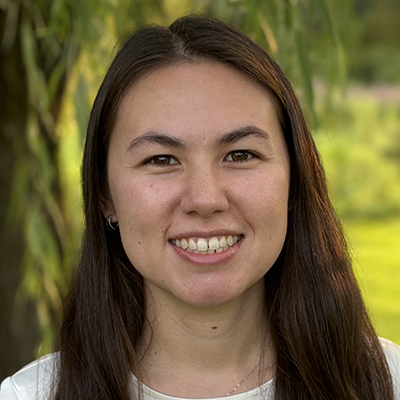2025
New Light: Rising Stars
in Energy and the Environment
Andlinger Summer Seminar Series
The New Light summer seminar series features the Andlinger Center’s Distinguished Postdoctoral Fellows and early career researchers. All seminars are in-person only and will be held in the Engineering Quad, Room E219, from 12:00 p.m. to 1:30 p.m. Lunch will be served at noon.
July 22: Maha Yusuf and Dominic Davis
-
Advancing Energy Security: In Situ 3D Neutron and X-Ray Imaging for Electrochemical Systems
 Bio
Bio
Maha Yusuf is a Presidential Postdoctoral Fellow at Princeton University. Her research focuses on advancing the fundamental understanding of physicochemical mechanisms that govern the performance and failure of electrochemical devices critical for energy sustainability and decarbonization. For her research, Yusuf has received funding and fellowships, including the 2025-2026 Andlinger Center Seed Grant, Princeton’s 2023-2026 Presidential Fellowship, Schlumberger’s 2018-2023 Faculty for the Future Fellowship, Stanford’s 2020-2022 Diversifying Academia, Recruiting Excellence Fellowship, the 2015-2016 Henry Windt Jr. Memorial Scholarship, and the Electrochemical Society’s (ECS) 2024 Colin Garfield Fink Fellowship and 2022 Edward G. Weston Fellowship. Her contributions have been recognized with the 2024 ECS Energy Technology Division Graduate Student Award, the 2024 MIT Chemical Engineering Rising Star Award, the 2022 American Chemical Society CAS Future Leader Award, and the 2020 Stanford Distinguished Student Energy Lecturer Award. Yusuf earned her Ph.D. and M.S. in Chemical Engineering from Stanford University.Abstract
Efforts to decarbonize and achieve net-zero greenhouse gas (GHG) emissions by 2050 rely heavily on electrifying the transportation sector, responsible for 28% of U.S. GHG emissions. While next-generation batteries must be low-cost, safe, fast-charging, long-lasting, and composed of abundant materials, challenges such as interfacial degradation, electrochemical-mechanical instabilities, and limited mechanistic understanding of key degradation phenomena hinder their practical implementation. In this seminar, I will demonstrate how advanced in situ/operando neutron and X-ray 3D imaging diagnostics, integrated with electrochemistry, address key challenges in energy storage systems. The discussion will focus on: (A) Technique development, including the feasibility of simultaneous neutron and X-ray tomography for visualizing graphite electrode degradation after fast charging. (B) Electrochemical engineering advancements, including the development of an anode-free solid-state battery compatible with simultaneous neutron and X-ray tomography. (C) Insights into 3D lithium plating morphologies in fast-charged lithium-ion batteries, and how lithium penetration and current density drive mechanical instabilities at solid-solid interfaces in anode-free solid-state batteries. These studies provide a deeper understanding of electrode deterioration, lithium behavior, and electrochemical-mechanical instabilities, which are critical for advancing next-generation batteries. This work highlights the essential role of advanced in situ 3D neutron and X-ray characterization and electrochemistry in advancing energy independence.
 Speed limits of the energy transition: Capital discipline in large-scale infrastructure development and other determinants of the pace of decarbonisation
Speed limits of the energy transition: Capital discipline in large-scale infrastructure development and other determinants of the pace of decarbonisationBio
Dominic Davis is an Associate Research Scholar at Princeton University’s Andlinger Center for Energy and the Environment. His research focuses on energy system transitions, with particular focus on the practicalities of large-scale infrastructure delivery and the determinants of speed of the energy transition. Davis completed undergraduate and Ph.D. studies in Mechanical Engineering at the University of Adelaide, where his doctoral research explored the application of solar thermal technologies in electricity generation and heavy industry. He subsequently undertook a postdoctoral appointment at the University of Melbourne, contributing to a range of energy systems research initiatives, including wind generation forecasting, electricity market analysis, and the Net Zero Australia project. In August, Davis is returning to Australia to take up a faculty position at the University of Melbourne, and is very interested in sparking up new collaborations!Abstract
To achieve mid-century net-zero goals, capital allocation and infrastructure development at unprecedented scale and pace are necessary. Macro-energy system models help to evaluate different pathways over this rapid transition and are relied upon to design policies that support preferred pathways. However, real-world conditions that are difficult to incorporate into models can have a serious speed limiting and cost escalating effect on the energy transition and potentially alter the feasibility of preferred pathways. Such real-world conditions include the way public and private actors consider risks and uncertainties in their decision processes for allocating capital to develop and deploy assets across many interdependent value and supply chains. This presentation describes the real-world, multi-year infrastructure development sequence that is undertaken for each and every large-scale clean energy asset, via a case study of green ammonia production and export from Australia. Bridging energy system modelling with real-world development characteristics provides a more realistic indication of energy project costs and the rate of their capacity expansion. Insights from this work assist modellers to improve their guidance, and identify opportunities for developers and planners to de-bottleneck and speed up the energy transition. -
July 15: Yifan Rao and James Coleman
-

Optimal Energy Embedding for Modular, Origami-Inspired Soft Robots
Bio
Yifan Rao, Ph.D. is a Distinguished Postdoctoral Fellow at the Andlinger Center for Energy and the Environment at Princeton University. She earned her Ph.D. in Engineering Mechanics from The University of Texas at Austin in 2024, where she investigated the nonlinear mechanics of ultrathin films and 2D materials for the seamless integration of flexible electronics with the human body. Her research has been published in leading journals such as Nature Communications, Science Advances, Chemical Reviews, and the Journal of the Mechanics and Physics of Solids (JMPS). At Princeton, Dr. Rao collaborates with Professors Glaucio H. Paulino and Minjie Chen to advance energy efficiency, reconfigurability, and embedded intelligence in soft robotics through the co-design of materials, structures, and actuation and control systems. Dr. Rao’s contributions have been recognized through several competitive honors, including Future Faculty Awards from the Society of Engineering Science (SES) in 2023 and 2025, and the Future Faculty Award from the Materials Research Society (MRS) in 2023. She currently serves as Chair of the 2025 Gordon Research Seminar on the Science of Adhesion and is an active reviewer for leading journals such as the Proceedings of the National Academy of Sciences (PNAS), Nano Letters, JMPS, and Extreme Mechanics Letters (EML).Abstract
Origami-inspired soft robots are emerging as lightweight, reconfigurable platforms for building sustainable systems that can adapt to diverse environments with minimal energy consumption. In this talk, I will introduce a new class of modular origami robots that wirelessly respond to magnetic fields (enabling folding, deployment, assembly, and locomotion) without the need for onboard motors or batteries. To enable such untethered and efficient operation, we propose optimal energy embedding: the co-design of mechanical, magnetic, and electrical systems to minimize energy input while maximizing control capability. These robots, actuated by a custom-designed electromagnetic platform, integrate magnetic components into origami-inspired architectures that facilitate the diverse mechanical responses. In this electromagnetic platform, a 3D Helmholtz coil system generates programmable magnetic fields through current-carrying coils, with currents precisely regulated by a modular drive system comprising a dc power source and a scalable power converter. To realize the optimal energy embedding, I establish a dynamic modeling framework and tailor actuation strategies for high-resolution, energy-efficient control over robotic motion and shape transformation. Applications range from self-assembling robots for environmental adaptation to origami state machines for mechanical logic and memory. By embedding intelligence into the physical structure and control.
Write Once, Run Anywhere: Portable Energy Management Software for Buildings
 Bio
Bio
James Coleman is a Ph.D. candidate in the C.H.A.O.S. Lab where he develops technology to increase energy efficiency and lower carbon emissions from the built environment by digitizing the operation of buildings. A key goal of his research is modernizing Building Automation Systems (BASs) to enable software portability and enable support for data-driven control algorithms, including Automated System Optimization (ASO) and Machine Learning. Prior to starting his Ph.D., Coleman was an engineering consultant on BAS and smart buildings projects in NYC. His work regularly brings together stakeholders from both academia and industry.Abstract
While nearly 40% of end use energy consumption in the U.S. occurs in buildings, less than 20% of buildings have the infrastructure needed to automatically manage consumption. Many obstacles slow the adoption of the necessary automation including cost, complexity, and a lack of organizational expertise. This presentation provides an overview of a collective effort by national labs, standard bodies, universities, and industry stakeholders to address the barriers to adopting building energy management at scale. Contributions and active research by the Princeton team are highlighted. Specially, we discuss how we’re operationalizing metadata models to enable self-adapting applications and how we’re closing a gap in the standards to enable applications to be more portable between buildings with different infrastructure vendors. -
July 1: Luo Xu and Tanuj Sen
-
Understanding blackouts in renewable electricity grids during climate extremes
 Bio
Bio
Luo Xu is an associate research scholar at Princeton University, affiliated with the Department of Civil and Environmental Engineering and the Center for Policy Research on Energy and the Environment. He obtained his Ph.D. in electrical engineering from Tsinghua University. He conducts interdisciplinary research at the intersection of climate science and power and energy systems, with a particular focus on energy system resilience under various climate extremes. His research integrates advanced modeling, optimization, and control techniques to develop resilience-oriented strategies, supporting resilient and sustainable energy transition. He is a recipient of the CIGRE Thesis Award, the Best Research Award from the IEEE PES Ph.D. Dissertation Challenge, and the IET Premium Award. He serves as the Chair of the IEEE Task Force on Cross-Sector Energy System Resilience Under Climate Change, Program Chair of the IEEE PES Energy Internet Coordinating Committee, Chair of the IEEE PES Princeton Central New Jersey Chapter, and Secretary of CIGRE Working Group D2.56. His research bridges theory and practice through close collaborations with industry partners, including grid operators and power utilities such as LUMA Energy, Con Edison, ISO New England, and State Grid.Abstract
Since the early 21st century, over 80% of major U.S. blackouts have been weather-related. Intensifying extreme events such as hurricanes, heatwaves, and wildfires, have nearly doubled weather-related outages in the past decade compared to the first decade of the century. Meanwhile, our energy sector, especially the electric power system, is becoming more exposed to the environment due to the large-scale integration of intermittent renewable energy such as solar and wind. Considering this increasingly coupled climate-energy challenge, in this seminar, I will introduce a coupled climate-energy model for cascading power outages, which comprehensively captures the impacts of climate extremes on renewable generation, and transmission and distribution networks. The model is validated with the 2022 Puerto Rico catastrophic blackout during Hurricane Fiona and is applied to explore the role of renewable integration in energy resilience.
Exploring and Optimizing the Environmental Impact of Power Electronic Circuits
 Bio
Bio
Tanuj Sen is a final year Ph.D. student in the Electrical and Computer Engineering department, advised by Prof. Minjie Chen, with his research focusing on power electronics. He received his Master of Sciences degree in Electrical Engineering and Information Technology from ETH Zurich, Switzerland in 2019. He also received the M.A. degree in Electrical and Computer Engineering from Princeton University, in 2022. His research interests include the design of high-power density, high-frequency resonant power electronic inverters for powering plasma heating coils in fusion reactors, design and analysis of coupled inductors and their application in high-frequency power electronic circuits, as well as the design and control of modern grid-connected power electronic inverters. His current work looks into the environmental impact of power electronic converters and developing an approach to optimize converter design with respect to both operational efficiency and associated carbon footprint.Abstract
Power electronic converters are usually designed to optimize their power density and efficiency. However, their environmental impact also needs to be considered to promote a more sustainable design process. This talk presents an example three-phase grid-connected power electronic inverter with a new circuit topology and control structure and also analyses the environmental impact of the inverter. Such an inverter consists of magnetic materials like NiZn, capacitors made of ceramic or polypropylene, semiconductor devices and other components, each of which have their own associated carbon footprint. The environmental impact for each of these components is measured on the basis of the total equivalent CO2 emissions associated with their manufacturing. These emissions together with the emissions associated with operating such an inverter are coupled to provide an estimate of how power electronic converters impact the environment. In addition, energy buffers are another example of power electronic circuits and are an important part of single-phase ac-dc power conversion. In this talk, a theoretical analysis of computing the per-unit environmental impact of switched capacitor energy buffers is also presented, which can be used to sustainably optimize their design. This per-unit emission computation technique can also be expanded to other converter designs. -
June 17: Amy Honnig Bassett and Monong Wang
-
Improving the Energy Density and Thermal Resistance of Dielectric Polymers via Zwitterionic Polyimides

Amy Honnig Bassett Bio
Amy Honnig Bassett completed her doctoral studies at Rowan University (Ph.D. 2024 in Chemical Engineering) and Drexel University under Professor Giuseppe R. Palmese. She developed fire-resistant epoxy thermosets for use in fiber-reinforced polymer composites by investigating the role of furan moieties on thermal decomposition and char formation. As a Distinguished Postdoctoral Fellow at the Andlinger Center for Energy and the Environment, Amy utilizes molecular design to develop polymers for energy storage applications in collaboration with Professors Emily C. Davidson and Rodney D. Priestley. This research focuses on enhancing the thermal stability and energy density of the polymers, ultimately advancing the accessibility of renewable energy and the electrification of transportation.Abstract
Advances in electrifying transportation necessitate improving dielectric capacitors. Conventional dielectric capacitors suffer from two major challenges: (1) low energy density (Ue) and (2) low operating temperatures (< 105 °C for industry standard biaxially orientated polypropylene, BOPP). Increasing Ue is necessary to enhance energy utilization efficiency and reduce device volume. Integration of current capacitors often places them in extreme environments. For instance, in electric vehicles and aircraft, capacitors are often placed in engine compartments where temperatures range from 150 to 300 °C, beyond the safe limits of conventional dielectric polymers. These limitations stem from the polymer’s properties, with Ue proportional to the dielectric permittivity (ε) and operating temperature dictated by the glass transition temperature (Tg). Moreover, conduction losses increase with temperature, further limiting their range. My work combines molecular design and materials engineering to address these challenges by developing zwitterionic polyimides. Zwitterions covalently bind a cation and an anion, resulting in a high ε while maintaining low conduction losses. I combine the benefits of zwitterions (high ε) with those of polyimides (high Tg) to simultaneously improve the Ue and operating temperature. This research offers insights into how molecular modifications enhance the dielectric performance of polymers, thereby advancing transportation electrification.
Membranes for resilient water and energy supplies

Monong Wang Bio
Monong Wang is a postdoctoral research associate in Dr. Ryan Kingsbury’s group at Princeton University, in the Department of Civil and Environmental Engineering (CEE). She is also affiliated with the Andlinger Center for Energy and the Environment. She earned her Ph.D. (2023) and M.S. (2018) in CEE from University of California, Berkeley with Dr. Baoxia Mi, and her B.S. (2017) from the Technion–Israel Institute of Technology in Israel. Monong’s primary research focuses on developing membranes with various functionalities, such as chemical and biological properties, for water purification and resource recovery.Abstract
Our demand for clean water and energy has nearly doubled over the past 50 years, as more of the global population undergoes industrialization. Currently and traditionally, we have relied almost entirely on freshwater and fossil fuels, which account for 99% of our total water supply and 82% of our energy supply. However, the availability of these resources is becoming increasingly vulnerable due to factors such as extreme climate events and overextraction. Establishing alternative resources is therefore essential for building a resilient society. In my talk, I will present my research on designing nanomaterial-based membranes for treating alternative water sources. I will discuss how fundamental studies on intermolecular interactions and transport theory can inform material and membrane design for optimized performance. Finally, I will demonstrate the potential of functional membranes, such as those with chemical and biological properties, to recover energy-related mineral resources for decentralized energy storage and generation. -